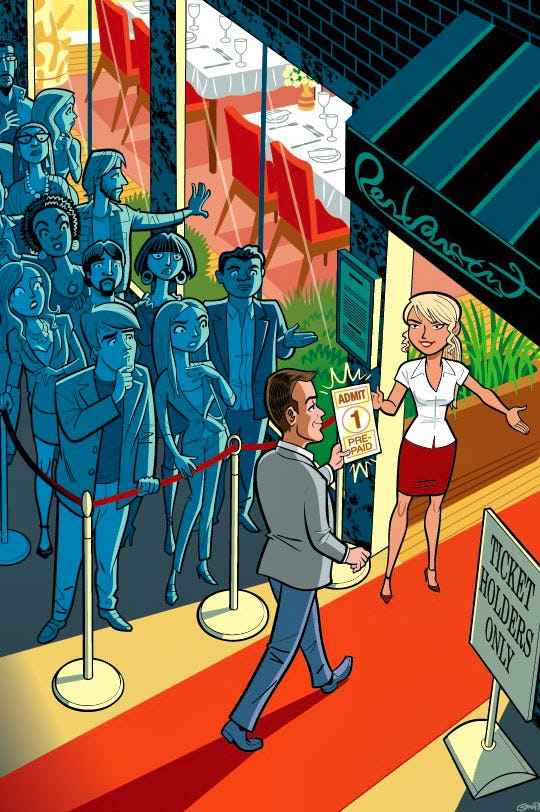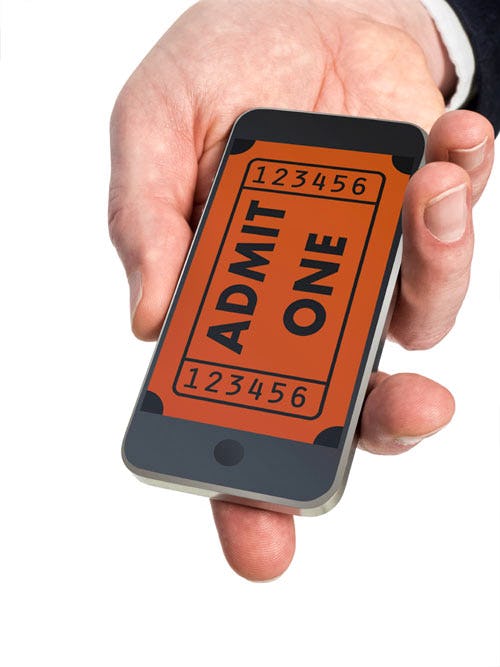With more restaurants asking us to pay up front, Square Meal’s editor asks whether this is a win-win for owners and diners or if it simply removes the romance from the experience.

The Clove Club in Shoreditch was the UK's highest climber on this year's S.Pellegrino World's 100 Best Restaurants list, shooting up 32 places to number 55. But it is also part of the global premier league of restaurants for a reason other than the quality of its food: like Alinea, at number 26, it has started to charge its customers upfront when they book a table for dinner.
Visit the reservations section of The Clove Club’s website and you will be told: ‘To make a reservation, please purchase tickets. The price of one ticket for dinner is for our five-course tasting menu’. Said menu will set you back £65 before you’ve even put a forkful of flamed Cornish mackerel, raw Orkney scallop or Yorkshire suckling pig in your mouth. While the food is paid for in advance, the drinks bill is settled at the end of the meal.
It won’t surprise you to learn that this is a trend that already has some traction in the United States, where some of the most prestigious restaurants operate a similar system:
Trois Mec in Los Angeles and
Coi in San Francisco among them, while Thomas Keller is believed to be considering it at
Per Se and
The French Laundry.
Profit and loss
I have mixed feelings about all this. I ought to be completely in favour of the policy: I’m not keen on eating at no-reservations restaurants for the simple reason that I like to know that I am going to be sitting at a table at the time I want to have my dinner, not standing in a queue outside. And since I hate changing my plans, I rarely cancel a reservation, so paying up front shouldn’t pose a problem for me.
I also have complete sympathy for the fact that no-shows can make all the difference between a restaurant making a profit or a loss over its dinner service – particularly in top-end places such as the one-Michelin-starred Clove Club. The higher up the foodie chain you go, the more the restaurant spends on the minutiae of the experience it offers – from the quality of ingredients to the calibre of staff – with the result that many Michelin-starred restaurants struggle to make a profit.

What’s more, the proof is in the pudding. Since introducing ticketing, no-shows at Alinea have dropped from 6 to 1 per cent; in the UK, no-shows are estimated at between 5-20 per cent of all reservations. I know several people who think that booking a table for dinner means making a reservation at five places and deciding where to eat an hour or so before arriving – leaving four empty tables dotted around town. (As such, if you want to bag a reservation at somewhere that’s hard to book, you should try your luck as a walk in.) It’s this sort of behaviour that understandably makes chefs and restaurateurs furious: there’s a Twitter account called No-Shows Montréal that names and shames flighty customers in the Canadian city.
And yet, I’m still a bit taken aback when a restaurant asks for my credit card details when I make a booking (a policy that seems to be on the rise, judging by recent experiences at Hakkasan Mayfair, The Square and Hibiscus). True, other forms of entertainment, such as the theatre, expect you to pay for your seat in advance – but they also charge more for your seat according to the view of the stage, in the same way that airlines charge more for your seat for flying at the busiest times. Of course, restaurants encourage diners to eat off-peak by offering cut-price menus at lunch and early evening, but if paying for your meal in advance takes off, will we see premium prices being levied to eat at the most popular times or for a seat that isn’t next to the loo?
 Penalty charge
Penalty charge
Ultimately, being asked to pay for your meal in advance feels rather like being told that if you don’t turn up to the dentist’s you will be charged for the appointment someone else could have had. And although it’s understandable on a financial level, it surely takes the romance out of going out to eat. And no matter how upmarket the restaurant, I can’t escape the feeling that buying tickets for dinner feels like turning up with a food coupon.
The best meals of course are often when someone else is paying. But if you do find yourself having to fork out for your supper, I’d recommend following the lead of the late Michael Winner. The film director and food critic had all his restaurant bills posted to his home address so he wouldn’t have to sully his hands with them at the end of the meal. There may be no such thing as a free lunch, but the longer one can pretend there’s no financial penalty in eating out, the better.
This article was first published in the summer 2015 issue of Square Meal Lifestyle magazine